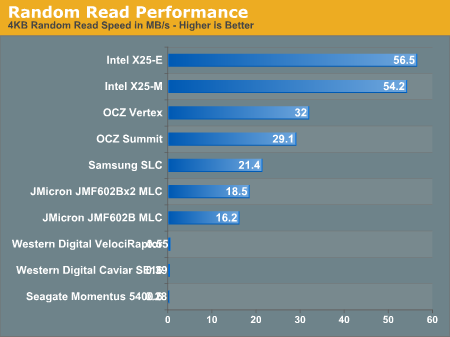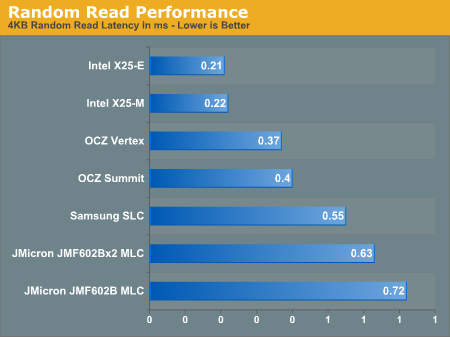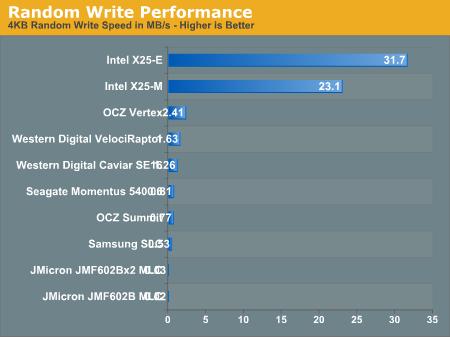The SSD Anthology: Understanding SSDs and New Drives from OCZ
by Anand Lal Shimpi on March 18, 2009 12:00 AM EST- Posted in
- Storage
Random Read/Write Performance
Arguably much more important to any PC user than sequential read/write performance is random access performance. It's not often that you're writing large files sequentially to your disk, but you do encounter tons of small file reads/writes as you use your PC.
To measure random read/write performance I created an iometer script that peppered the drive with random requests, with an IO queue depth of 3 (to add some multitasking spice to the test). The write test was performed over an 8GB range on the drive, while the read test was performed across the whole drive. I ran the test for 3 minutes.

The three hard drives all posted scores below 1MB/s and thus aren't visible on our graph above. This is where SSDs shine and no hard drive, regardless of how many you RAID together, can come close.
The two Intel drives top the charts and maintain a huge lead. The OCZ Vertex actually beats out the more expensive (and unreleased) Summit drive with a respectable 32MB/s transfer rate here. Note that the Vertex is also faster than last year's Samsung SLC drive that everyone was selling for $1000. Even the JMicron drives do just fine here.
If we look at latency instead of transfer rate it helps put things in perspective:

Read latencies for hard drives have always been measured in several ms, but every single SSD here manages to complete random reads in less than 1ms under load.
Random write speed is where we can thin the SSD flock:

Only the Intel drives and to an extent, the OCZ Vertex, post numbers visible on this scale. Let's go to a table to see everything in greater detail:
| 4KB Random Write Speed | |
| Intel X25-E | 31.7 MB/s |
| Intel X25-M | 23.1 MB/s |
| JMicron JMF602B MLC | 0.02 MB/s |
| JMicron JMF602Bx2 MLC | 0.03 MB/s |
| OCZ Summit | 0.77 MB/s |
| OCZ Vertex | 2.41 MB/s |
| Samsung SLC | 0.53 MB/s |
| Seagate Momentus 5400.6 | 0.81 MB/s |
| Western Digital Caviar SE16 | 1.26 MB/s |
| Western Digital VelociRaptor | 1.63 MB/s |
Every single drive other than the Intel X25-E, X25-M and OCZ's Vertex is slower than the 2.5" Seagate Momentus 5400.6 hard drive in this test. The Vertex, thanks to OCZ's tweaks, is now 48% faster than the VelociRaptor.
The Intel drives are of course architected for the type of performance needed on a desktop/notebook and thus they deliver very high random write performance.
Random write performance is merely one corner of the performance world. A drive needs good sequential read, sequential write, random read and random write performance. The fatal mistake is that most vendors ignore random write performance and simply try to post the best sequential read/write speeds; doing so simply produces a drive that's undesirable.
While the Vertex is slower than Intel's X25-M, it's also about half the price per GB. And note that the Vertex is still 48% faster than the VelociRaptor here, and multiple times faster in the other tests.










250 Comments
View All Comments